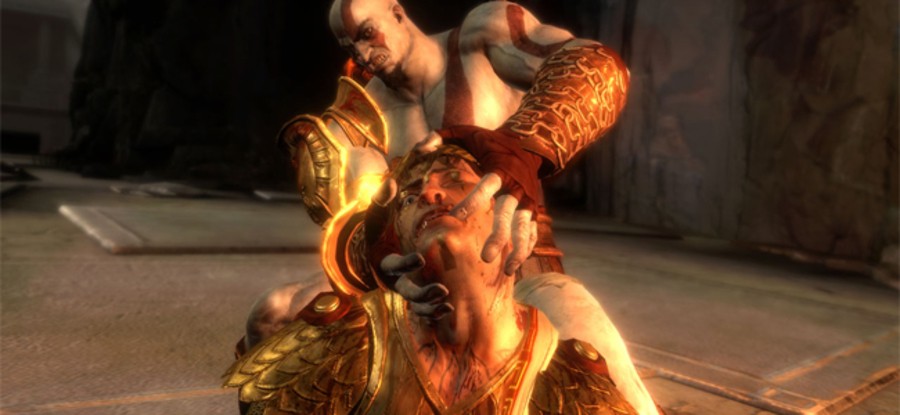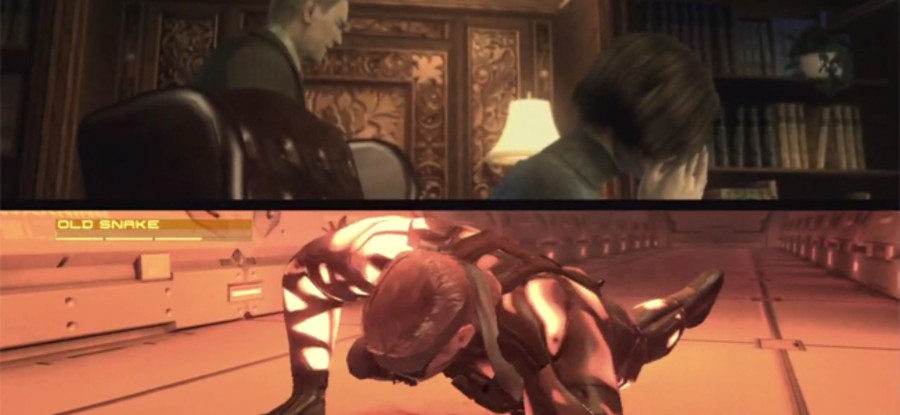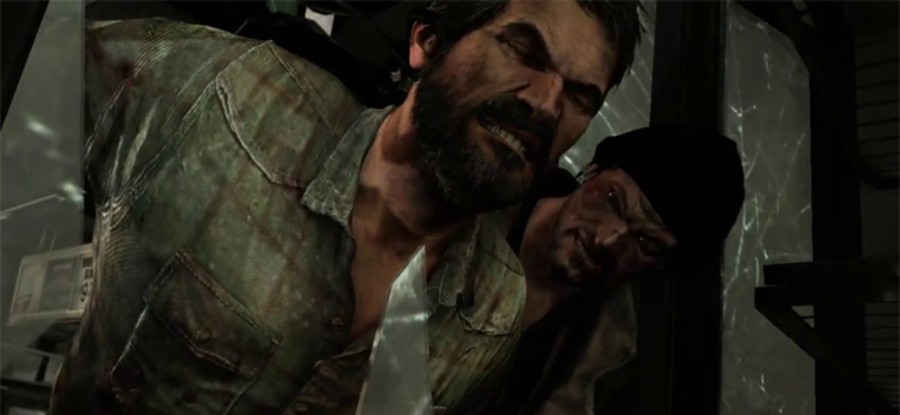
These days, few things in games frustrate me more than a blinking button on the screen. I’d never really noticed the frequency of these quick-time events in the past – an odd thing for a God of War stalwart to admit – but lately this lazy design mechanic has been causing me to lose it. I believe it was during a pre-release press trip to see The Last of Us where this flagrantly overused feature was pointed out to me. “So, when are developers going to stop with these button bashing sequences?” managing director Anthony Dickens asked me, as he performed thumb exercises on a DualShock 3. I laughed it off and shrugged, secretly pondering what the big fuss was about.
However, in the twelve or so months since that day, this flaw has caused more furrows on my face than Manchester United’s first post-Sir Alex Ferguson season. I murdered my way through Call of Duty: Ghosts over the past few days – a perfectly competent if overwhelmingly formulaic first-person foray, by the way – and that campaign was packed to the figurative fill line with dumb DualShock 4 destroying interactive cut-scenes. On one occasion I had to pump the trigger in an unflattering manner in order to break free from some debris, and on many others I was forced to repeatedly jab the square button like I was training for the thumb wrestling world championships.

I understand why these scenarios exist. In almost all of the above examples, developer Infinity Ward was trying to make me feel the struggles of my character. It’s the gaming equivalent of a staccato passage in an epic piece of music, designed to make you clench your fists and feel the tension of your alter-ego. And sometimes it works – in Metal Gear Solid 4, for example, where you must guide an ageing Snake through a reactor by pushing the triangle button repeatedly for a full five or so minutes. In this instance, the clever presentation – which shows several other events occurring at the same time – makes it a trademark Hideo Kojima magic moment. But it’s in limited company.
In fact, the only other game that I can think of where I enjoyed a similar sort of scenario is Heavy Rain – and, to a lesser extent, Beyond: Two Souls. The former is filled with moments that force you to play twister with the DualShock – intentionally adopting an awkward control scheme in order to convey the perils of the protagonist that you’re playing as. There’s also that moment involving a finger and lots of blood, but if you haven’t experienced the Saw-inspired sequence for yourself, I’ll refrain from going into too much detail. Still, even those Quantic Dream developed titles – for as clever as they are the majority of the time – fall into the exact same trap as Call of Duty: Ghosts.
And the problem is that it’s just not fun. The intention may be to put stress and strain on the player, but there has to be another way. I recently tried Alien Isolation, and the survival horror included an interesting alternative. After working you into a frenzy by forcing you to play cat-and-mouse with its titular extraterrestrial, you find yourself hiding in a locker. Naturally, the big-headed beast sniffs you out, and the game tells you to hold your breath. There’s no button bashing exercise here, though; instead, you simply pull the analogue stick back. You could succeed by giving it a gentle tug, but the way that the game plays with your emotions in the build up to that moment means that you’ll almost certainly yank at it like your real-life depends on it.

I never felt that way in Call of Duty: Ghosts – or the dozens of other games that have included this feature in the past. Even the seminal God of War series – where you’re battling with the controller to rip off heads and slaughter colossal sea monsters – fails to really connect you to the character through these energy exhausting quick-time events. In fact, arguably the best finisher in Sony Santa Monica’s mythological series to date is the one that requires the least amount of exertion – when you pop both analogue sticks in order to blind wet blanket Poseidon from a second-person perspective in God of War III.
So while I don’t necessarily have a solution to this somewhat pedantic problem, I can say with confidence that developers are failing to connect me with their campaigns by forcing me to grind my controller into fairy dust. These tiring International Track & Field-inspired sequences may seem like a convincing way of conveying tension, but all they’re really successful at is obliterating any sense of immersion. Alien Isolation appears to understand this, using every facet of its presentation to make you feel the predicament of its protagonist, rather than lazy button bashing screens. Perhaps it’s time that other studios started to think outside of the box, too, instead of overusing this annoying mashing mechanic.
Are you similarly frustrated with the emphasis on button bashing sequences in blockbuster games? Is this something that you haven’t really noticed before? Do you like the sense of tension that this mechanic conveys? Tap square a thousand times in the comments section below.





Comments 30
I can't stand them in games :-/
I think we all thoroughly hate then. Strangely in some games they aren't as annoying as others. The qte in the Uncharted games were horrible for example. I got so tired of fighting that big dude in UC3!
Interesting feature , I myself enjoy button bashing QTE's . shenmue "title" QTE (the punching one) was great . when on holiday I seek out "fist of the north star" punching game - broke a brand new watch on this once (great times!)
@eliotgballade I don't mind QTEs too much per se, it's just the ones that make you repeatedly bash a button.
I honestly dont care either way. I dont think its as big of a problem as it seems & QTE's aren't as widespread as people make them out to be.
I'm okay with something occasional, like lifting a gate or what not, too many can be a bad thing.
@get2sammyb Have you ever played Mercenaries 2? That has the worst quick time events in every way possible. Annoying use them to hijack tanks, that's the least of it. They are too quick, so most of the time you need to try multiple times to hijack one. And on the subject of the article, the button mashing ones are insane. There are a few tanks that I tried to hijack, and I couldn't (we are looking at over 20 attempts here) because of the button mash. I later discovered it was just possible if you used the vibrating technique with your index finger on them. I don't know who thought it was fun in anyway.
@SimonAdebisi : yes "lets play darts" shenmue is great (always wondered what happened to your darts when you finished though !)
Personally I'm not a fan. RE5's were pointless and more recently I don't feel they brought anything to the tomb raider and Spider-Man 2 games apart from being an annoyance.
@Mrskinner I hated Tomb Raiders, because they made you act fast. Which is normally great, but I died so many times because it expected me to react faster than what I felt was possible on the first try. But maybe that's just me.
@ztpayne7 yeah I have to agree, it always felt to me that if you managed to complete first try it was always more luck than skill. I actually don't mind big qte on boss battles etc, but as just filler for a level, not a fan. I have to admit the qte's in arkham origins were painful also
Don't mind QTEs if they're used sparingly, but then if they are, what's really the point? Button mashing ones usually add absolutely nothing to the experience, aside from a few that are wedged in gameplay rather than cutscenes, like the weapon clashes in Dynasty Warriors, for example.
But yeah, I don't know what the fascination with them is. It's the notion that cutscenes have to be interactive, and while I agree that sitting watching a 10 minute cutscene can be incredibly boring, there must be better ways to interact.
Games like Mass Effect have dialogue options, and games like Skyrim hardly feature any cutscenes whatsoever — it's all completely in game. I think the need for button presses mostly comes from developers that think "oh we better keep the player engaged, give them a button to mash while this scene happens". The whole situation is a bit of a pickle.
I quite like qte's to be honest
I have to respectfully disagree with the Metal Gear Solid 4 example. That to me was the worst QTE that I have ever encountered. I don't care what else is going on presentation-wise, having to hit the same button over and over again for 5 freaking minutes is just pointless and ridiculous ware and tear on the controller. I actually played that sequence with my girlfriend's hot pink Dualshock so that my own wouldn't have to suffer.
I don't mind when a single button prompt shows up on screen (like in God of War), but those repetitive, hit-the-same-button-over-and-over again QTEs drive me crazy. The Walking Dead comes to mind here...
The absolute worst offender among these was the torture scene from MGS: Peace Walker HD. I'm smashing the crap out of that Y button, but I couldn't do it. I had to use a workaround via co-op.
Thief immediately came to mind. When you have to hammer square to jam your tool into a window and lift it I got so irritated especially because you had to do it so much.
I did definitely notice this mechanic for the first time in god of war on ps2. After that it seemed to be popping up in lots of different games. I agree with the sammy that this has been sorely overused to convey a feeling tension or struggle. Developers need to stop copying what popular franchises have proven to be successful and try reaching into their own creative box.
I like 'em. I found them excellent on Naruto Ninja Storm games and good on both Asura's wrath and God of War games.
MGS4 is also the only time I can remember enjoying pounding a button in a QTE. I hit that thing as hard and fast as I could.
worst execution: Ace Combat Assault Hotizon (no need for inclusion in series at all!)
best execution: MGS4 final fist-fight (no button prompts, but still an interactive cutscene)
And MGS1 was my first torture session with them, indeed
I enjoy button mashing on the God of war franchise as a lot of the time it's something that requires his strength e.g opening chests or gates so in my opinion it makes sense to have to do it on those moments because... Well I can't explain it but it just clicks if that makes any sense to you
I don't mind them, I barely even notice them.
My biggest problem with QTEs is how many of the damn things there are. For a while there, it felt like developers had conflated repeatedly tapping a single button with actual gameplay. I think QTEs are at their best when they're used sparingly, and MGS 4 is a perfect example of that. There is no other (that I can remember) use of QTEs in that game, so the one time they are used is rendered that much more effective and meaningful.
If you don't like button bashing in GoW for example, try in Jurassic Park from Telltale, you gonna hate even more.
When done right QTEs are fine.
I don't mind it in God of War because you at least have some control, but I think that these button-mashing QuickTime events are just the devs being lazy.
@ztpayne7
I agree. I hated Tomb Raider QTE's as well. The aggravating button prompts became exponentially intrusive as they didn't give you enough time to react in many scenarios, leaving Laura's neck to come crashing down on a wooden javelin, or a wooden spike through her forehead. When you replay the sequence three times and KNOW the QTE is coming, and STILL can't successfully trigger the event, there's a serious problem.
Other than those QTEs and the lack of puzzle element in the game though, Tomb Raider was a nice play. I actually did enjoy the game quite a bit, despite my complaints.
I'm also not a fan of QTE's but do agree they somehow fit the GoW series well.
Most will probably disagree, but I though QTEs were quite well executed on Final Fantasy XIII-2, even the button mashing ones.
QTE is a lot of fun..not sure what all the fuss is about..
I don't mind QTEs as long as they're done right.
@Heavyman99 I remember that! When the HD collection was released, I thought that torture sequence was going to be easier with a PS3 controller. I was dead wrong XD
Show Comments
Leave A Comment
Hold on there, you need to login to post a comment...